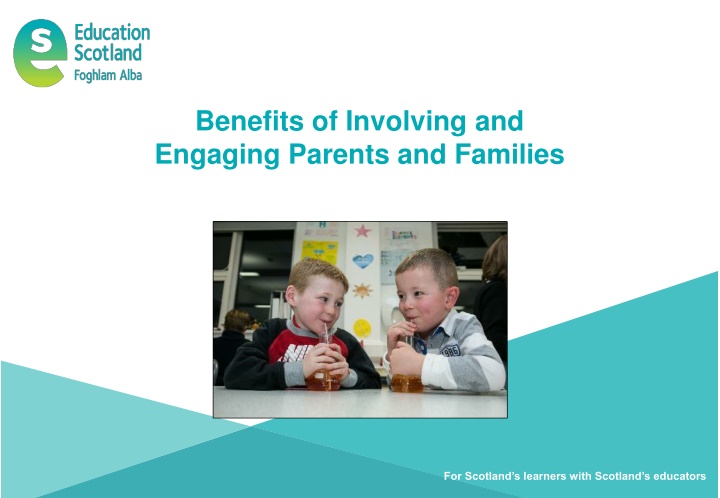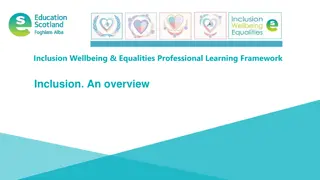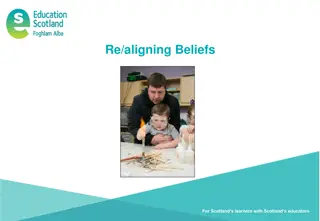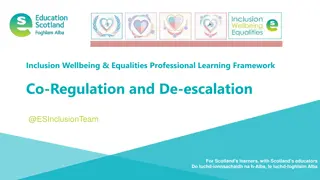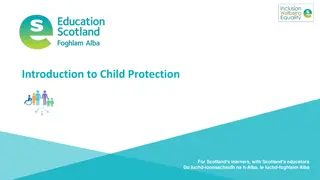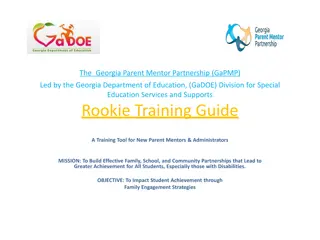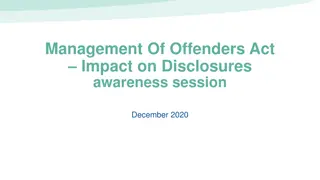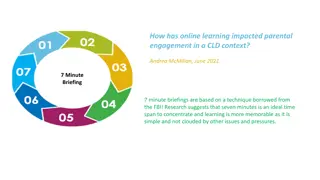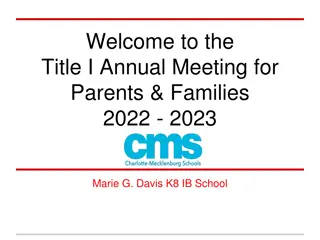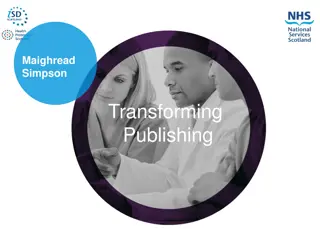Enhancing Learning Through Parent and Family Engagement in Scotland
Involving parents and families in education is crucial for building trust, improving academic success, and overall well-being of learners in Scotland. Collaboration between educators and families creates opportunities for children to develop essential competencies. Effective engagement strategies focus on enhancing parents' confidence and understanding to support their children's learning journey. Valuing these relationships leads to better outcomes for students, parents, and schools in Scotland.
Download Presentation

Please find below an Image/Link to download the presentation.
The content on the website is provided AS IS for your information and personal use only. It may not be sold, licensed, or shared on other websites without obtaining consent from the author.If you encounter any issues during the download, it is possible that the publisher has removed the file from their server.
You are allowed to download the files provided on this website for personal or commercial use, subject to the condition that they are used lawfully. All files are the property of their respective owners.
The content on the website is provided AS IS for your information and personal use only. It may not be sold, licensed, or shared on other websites without obtaining consent from the author.
E N D
Presentation Transcript
Benefits of Involving and Engaging Parents and Families For Scotland s learners with Scotland s educators
Valuing parent, family and school relationships (Cont.) Parent involvement is valuable in that it contributes to the building of trust and relationships between parents and educators. Parent engagement in teaching and learning is a critical factor in a child s academic success and overall well-being. It is a vital component of a child s educational journey, and it can take on various forms, adapting to the specific needs and dynamics of families. Every parent can and does support their children s education in various ways. It is important to note that differing outcomes are achieved, depending on where they place their energy . (Pushor, D. Revisiting parent engagement in present times ) For Scotland s learners with Scotland s educators
Valuing parent, family and school relationships (Cont.) When educators and families collaborate as partners, they create important opportunities for children to develop social, emotional, and academic competencies. The reason for educators and families to co-operate, co-ordinate, and collaborate is to enhance learning opportunities, educational progress, and school success . (Edwards, P.A., Peltier, M.R. and Porter L. (2023), Collaborating to Promote Family Literacy In: Caspe, M. Hernandes, R. Family and Community Partnerships . Charlotte NC. Information Age Publishing Inc. pp101 For Scotland s learners with Scotland s educators
Valuing parent, family and school relationships The review found that the most effective way of helping low-income children to achieve their ambitions was not by focusing on aspirations; it was focusing on some of the key objectives of family learning: engaging parents in their children's learning, engaging parents in their own learning, and providing a range of support for children. Interventions that helped parents feel more confident and competent at being involved with their children's learning produced better outcomes, as did those that helped parents better understand how the education system works and how they can work with teachers and schools to help their children reach their full potential. Carpentieri, J.D. (2012), Family learning: a review of the research literature - https://learningandwork.org.uk/wp-content/uploads/2020/05/Family- learning-A-review-of-the-research-literature.pdf For Scotland s learners with Scotland s educators
Benefits for parents and families Their children do better when they are involved They are better supported to help and encourage their children's learning and development They have more information about their children's education Parents can support each other through peer mentoring which can have an impact on reducing isolation and build their confidence and skills Parents get reassurance that their children are receiving a good education https://education.gov.scot/resources/engaging-parents-and-families-a- toolkit-for-practitioners/ For Scotland s learners with Scotland s educators
Benefits for children and young people It is easier for children and young people to learn when they get encouragement at home They will attain and achieve more when their parents are involved Children and young people get access to more activities in and out of settings when there are more adults to help Any concerns in the setting or school can be addressed more easily when parents and settings/schools work together They are happy when their parents are enjoying events in the setting or school https://education.gov.scot/resources/engaging-parents-and-families-a- toolkit-for-practitioners/ For Scotland s learners with Scotland s educators
Benefits for ELC settings and schools Parents bring skills and cultural diversity which can enhance children s learning Parents contribute their time, so together parents and practitioners are able to do more activities with children and young people than practitioners can do on their own Children and young people s attainment and behaviour improve Parents have ideas about how the ELC setting or school can best support their children Practitioners have people with whom they can talk over ideas and get help when developing plans for the ELC setting or school Parents can contribute to improvement planning and an enhanced curriculum https://education.gov.scot/resources/engaging-parents-and-families-a- toolkit-for-practitioners/ For Scotland s learners with Scotland s educators
Benefits for the local authority The local authority can draw on the ideas and experience of parents to influence future strategic developments The local authority can benefit from feedback provided by parents on how effective its policies and education provisions are working in practice Local authorities can benefit from parental participation in implementing and reviewing local policies https://education.gov.scot/resources/engaging-parents-and-families-a- toolkit-for-practitioners/ For Scotland s learners with Scotland s educators
Benefits of Family Learning Positive impact on parents literacy, numeracy, communication, self- confidence and efficacy (Swain, Brooks & Bosley, 2014). The course helped people gain self-esteem and self-confidence which in turn helped parents communicate better with their children and teachers at school. Every person interviewed now takes part in either parent councils or school activities. Research on the value of FL to parents shows that opportunities to experience success in learning enables parents to change their literacy, numeracy and communication practices as well as improving their self-confidence and efficacy Gale Macleod & Lyn Tett (2019) Dr K Stelfox, P Bain, S Foreman (2017) Family Learning programmes increase the employability of parents/carers whilst also equipping them to support their children s learning and development. (2016) The idea that parents need to be literate and that through the intergenerational transfer of skills and attitudes, the parents' education can influence the subsequent educational achievement of their children, is a foundational belief of contemporary family learning programmes. Children become more confident about their learning capacities which in turn leads them to persist in the face of challenges (Horne & Haggart, 2004); (Sticht, Towards a Multiple Life Cycles Education Policy , 2007) This study provides evidence that after attending family literacy sessions children improve their literacy skills and there are positive changes in the home literacy environment (2016) Family-centred literacy programmes, however, show that there are immediate benefits as well as a longer-term impact for both children and adults (Brooks et al, 2008; Carpentieri et al, 2011; Hayes, 2006; Tuckett, 2004). For Scotland s learners with Scotland s educators
